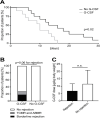Impact of G-CSF Therapy on Leukopenia and Acute Rejection Following Kidney Transplantation
- PMID: 34987735
- PMCID: PMC8717965
Impact of G-CSF Therapy on Leukopenia and Acute Rejection Following Kidney Transplantation
Abstract
Background: Leukopenia is a common problem after kidney transplantation. The therapeutic approach typically includes a reduction of the immunosuppressive therapy, which is associated with an increased risk of rejection and allograft loss. Granulocyte colony-stimulating factor (G-CSF) is used as a therapeutic option to raise the leukocyte blood count; however, the effect on acute rejections is controversial.
Objective: The goal of this study is to examine the incidence of acute rejections following G-CSF therapy.
Methods: We retrospectively evaluated patients with leukopenia following kidney transplantation and GCSF therapy between January 2007 and December 2017 at our center compared to controls with matched minimal leucocyte blood count in a matched pair analysis.
Results: We identified 12 patients, who received G-CSF therapy with a cumulative dose of 10.74 µg/kg body weight over a time frame of 4.3 days. G-CSF therapy resulted in a significantly shorter time period with leucocytes <3,000/µL (9.5 vs. 16.6 days), but also trended towards an increased risk of rejection within the next 30 days with three patients in the G-CSF group and no patient in the control group (p=0.06) developing an acute biopsy-proven rejection. Infection and mortality rate in the subsequent year were not different between groups.
Conclusion: G-CSF therapy decreases the duration of leukopenia post-kidney transplantation, but may also increase the risk of an acute rejection.
Keywords: Granulocyte colony-stimulating factor; Kidney transplantation; Leukopenia; Rejection.
Conflict of interest statement
None to be declare.
Figures


References
-
- Hartmann EL, Gatesman M, Roskopf-Somerville J, et al. Management of leukopenia in kidney and pancreas transplant recipients. Clin Transplant. 2008;22:822–8. - PubMed
-
- Brum S, Nolasco F, Sousa J, et al. Leukopenia in kidney transplant patients with the association of valganciclovir and mycophenolate mofetil. Transplant Proc. 2008;40:752–4. - PubMed
-
- Kotton CN, Fishman JA. Viral infection in the renal transplant recipient. J Am Soc Nephrol. 2005;16:1758–74. - PubMed
-
- Zafrani L, Truffaut L, Kreis H, et al. Incidence, risk factors and clinical consequences of neutropenia following kidney transplantation: a retrospective study. Am J Transplant. 2009;9:1816–25. - PubMed
-
- Ojo AO, Hanson JA, Wolfe RA, et al. Long-term survival in renal transplant recipients with graft function. Kidney Int. 2000;57:307–13. - PubMed
LinkOut - more resources
Full Text Sources
